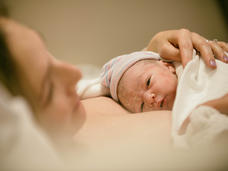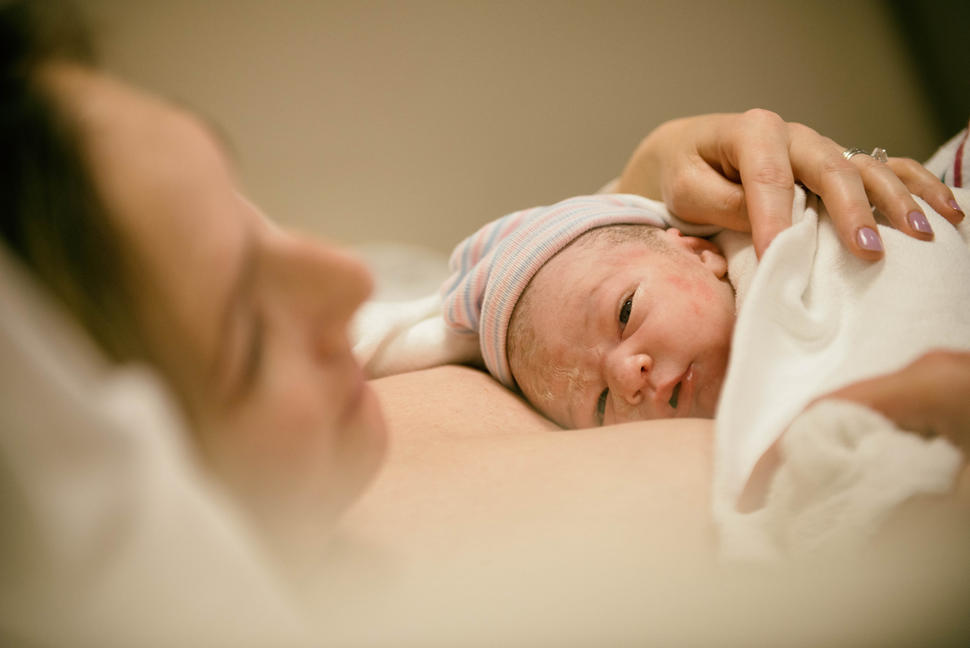, by NCI Staff
First, the good news: Survivors of childhood cancer who became pregnant in adulthood are as likely to have healthy babies as those without a history of cancer, according to a new study. Their children also didn’t have higher risks of birth defects or other health problems at birth.
However, the study does suggest that these women face other pregnancy risks that may warrant more intensive obstetric care. For example, women who had been treated for cancer as children had higher risks of several severe complications during pregnancy, delivery, and the period after delivery.
The results were published January 19 in the Journal of the National Cancer Institute.
“The message here is largely positive,” said study leader Paul Nathan, M.D., of the Hospital for Sick Children in Toronto, Canada. “Women who have a history of childhood cancer have a really good chance of getting pregnant, and most of them are quite fine through the pregnancy. But it’s super important for the people caring for them to know about these risks.”
In the United States, many health care providers may not know if a patient was treated for cancer as a child, especially if they’ve moved between medical systems, cities, or states, explained Emily Tonorezos, M.D., director of NCI’s Office of Cancer Survivorship, who was not involved with the new study.
“High-risk obstetric care is widely available in most of the country, but childhood cancer survivors may not be recognized as needing that kind of care,” she said.
Beyond fertility, to pregnancy
Major progress has been made in treating many childhood cancers over the last several decades. Today, about 85% of children diagnosed with cancer will live for 5 or more years, compared with about 58% in the 1970s. Many of these cancers will never return.
These successes have allowed researchers to turn some of their focus to making treatments less toxic and improving the quality of life for survivors of childhood cancer as they grow up.
“When you talk with adolescents and young adults about their big post-cancer concerns, fertility is very high on that list,” said Dr. Nathan.
Cancer treatments can potentially affect future fertility for both women and men. For example, radiation therapy to or near the abdomen, pelvis, or spine can harm nearby reproductive organs. Radiation therapy to the brain can also damage the pituitary gland, which helps control the production of certain hormones needed for pregnancy.
Some types of chemotherapy can affect the ovaries, causing them to stop releasing eggs and estrogen. Having been treated for cancer during childhood can also affect sexual health, body image, and financial stability during childbearing years.
Many studies have focused on fertility preservation, with promising results. Women and girls now have several options that can help preserve their fertility, including freezing embryos or eggs. And new technology holds promise for boys undergoing cancer treatment before they’re old enough to freeze sperm.
Fewer studies to date have focused on what happens during pregnancy for survivors of childhood cancer. Despite the shortage of data, international guidelines were recently published to help doctors counsel their patients who are survivors about any specific pregnancy-related issues, explained Dr. Tonorezos.
The guidelines were an important first step, she continued.
“But more research to better understand the risks during pregnancy for childhood cancer survivors is urgently needed,” she said. “I think there are some lingering fears among survivors about pregnancy after cancer.”
Mostly safe, some risks for women
For their study, Dr. Nathan and his colleagues examined data captured by the single-payer health insurance program covering Ontario, Canada. They identified about 4,000 women who had been treated for cancer between 1985 and 2012 before the age of 21.
The team matched each of the 4,000 women to five other women who weren’t treated for cancer before age 21 by age and postal code, and then compared reported pregnancies between the two groups. They also compared the risks of miscarriage past 20 weeks into pregnancy, as well as the risks of more than 40 other health problems (for both mothers and children).
The researchers found that cancer survivors were just as likely to carry their pregnancy past 20 weeks. However, about 9% of babies born to survivors were preterm (defined as birth before week 37 of pregnancy), compared with around 6% of babies born to women who had not been treated for cancer.
There was no difference in birth defects or Apgar scores (a screening test used at birth to determine the baby’s need for additional medical services) between babies born to cancer survivors and the women in the control group.
Survivors didn’t have higher risks of preeclampsia, gestational diabetes, or caesarean delivery. However, they were at higher risk for several other complications, including heart problems and severe complications during or after birth. Several aspects of patients’ medical or treatment history were associated with specific pregnancy complications.
Overall, by age 30, the survivors were somewhat less likely than women not treated before the age of 21 to have been pregnant. About 22% of cancer survivors in the study had a recorded pregnancy, compared with about 27% of women not treated for a childhood cancer.
The databases used in the study did not collect information on whether women were unable to conceive. However, other studies have also shown fewer pregnancies among cancer survivors, wrote Hazel Nichols, Ph.D., of the University of North Carolina, and Daniel Green, M.D., of St. Jude Children’s Research Hospital, in an accompanying editorial.
Such trends indicate that “to fully support cancer survivors, it is also essential to consider the indirect consequences of an early cancer diagnosis, including disruptions to relationships, impacts on sexual health, and the potential for financial hardship, as additional challenges to parenting goals,” they wrote.
Recognizing the need for high-risk obstetric care
Overall, the number of serious complications were fairly small. Only 87 out of more than 4,000 survivors (about 2%) experienced either a severe complication during labor or developed a heart problem during pregnancy. However, cancer survivors were twice as likely to experience either issue as women not treated for cancer.
And the potential impacts of these complications can be severe. Women who were treated for cancer before the age of 21 would benefit from discussions with their doctors about whether they need a referral for high-risk obstetric care, said Dr. Nathan. Such care can include monitoring a woman’s heart throughout pregnancy, as well as frequent fetal monitoring.
Most pregnant survivors are seen by family doctors or obstetricians who may know nothing about their cancer history or these specific risks, Dr. Nathan said. “[Figuring out] how to share this information with health care providers is going [to be] one of our key goals,” he added.
Health care providers’ knowledge of a patient’s cancer history can also spur other important conversations about reproductive health. For example, some women go through menopause early after taking certain chemotherapy drugs, Dr. Nathan said. That can shrink their window for conceiving—or pursuing fertility preservation techniques—compared with women who haven’t been treated for cancer.
“The burden of making sure you’re getting good health care is very often on the survivor and their family,” said Dr. Tonorezos. “That’s not where the burden should be, but survivors need to [make sure] health care providers have some of that information, because sharing data is not built into our health system,” she added.
Future research that would be helpful to survivors hoping to become pregnant could include testing which prenatal care strategies provide the most benefits in terms of preventing dangerous complications, Dr. Tonorezos said.
But overall, these results are encouraging, she said. “The expectation of a healthy pregnancy and a healthy baby should be the norm, even for childhood cancer survivors,” she said.









